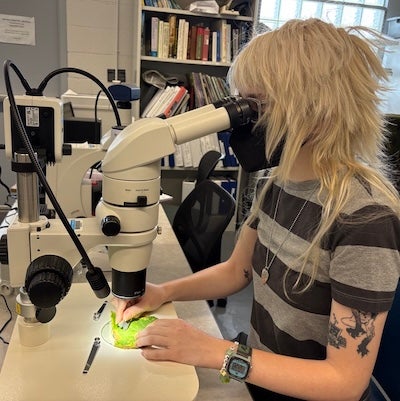Lou Cabrera, an environmental science and management major from Piermont, New York, spent the summer immersed in hands-on research through a CELS Summer Research Fellowship at the University of Rhode Island’s Plant Diagnostic Laboratory. A service of URI Cooperative Extension, the lab provides essential plant testing, diagnostic, and consultation services to farmers, nurseries, landscape professionals, government agencies, and the public across Rhode Island.
Under the mentorship of Keiddy Urrea-Morawicki, the lab’s director, Cabrera contributed to diagnosing plant pathogens, developing lab protocols for disease identification, and supporting education and outreach initiatives statewide. Among the highlights of the experience? Tackling complex diagnostic puzzles, cultivating fungi with artistic flair, and creating tools that will assist future plant pathologists.
“My fellowship allowed me to gain a deeper understanding of what it means to be a plant steward,” Cabrera says. “It strengthened my passion for learning and research, and I’ve seen real growth in my critical thinking skills. Now that I’ve had hands-on experience, I find it easier to apply what I learn in class. Socially, I’ve become a more confident communicator with professors and peers.”
During the fellowship, Cabrera focused on developing diagnostic protocols for several major tree and forest diseases, including Verticillium Wilt, Dutch Elm Disease, Chestnut Blight, Oak Wilt, Anthracnose, and Beech Leaf Disease. They collected samples through both field surveys and lab submissions, experimenting with tissue extraction and cleaning techniques to ensure accurate pathogen identification. Cabrera is currently drafting protocols for Anthracnose, Beech Leaf Disease, and Chestnut Blight, and plans to develop a molecular testing protocol for Oak Wilt using the lab’s new diagnostic technology.
This experience has shaped Cabrera’s vision for future research and career goals. “I hope to continue conducting research that helps us better understand climate change and explore ways to mitigate its impacts,” Cabrera adds.
Recently, the Plant Diagnostic Laboratory achieved Core Accreditation through the National Plant Diagnostic Network, recognizing it as a high-quality, standardized diagnostic facility. This prestigious designation reflects the lab’s excellence in protocols, equipment maintenance, data management, staff training, risk mitigation, and biosecurity practices. Cabrera played a key role in helping the lab reach this important milestone.
As an essential part of URI’s land-grant mission, Cooperative Extension has served as a trusted resource for Rhode Islanders since 1904, addressing agricultural challenges with science-based solutions. The Plant Diagnostic Laboratory embodies this mission: partnering with agricultural communities to deliver cutting-edge research, practical expertise, and innovative problem-solving to strengthen the state’s environmental and agricultural health.

